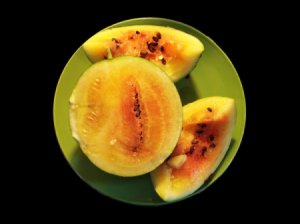
 In July 2015, I submitted a rather lengthy post titled 'Do Different Vegetables "Cross"?
In July 2015, I submitted a rather lengthy post titled 'Do Different Vegetables "Cross"?
To me, this is a serious question posed by well meaning people and deserves a detailed answer. Before giving my answer, I did more research than I have ever done before on a ThriftyFun post.
Armed with much information from experts in different fields, I was able to answer the question with an emphatic 'No'. Also, I was able to give detailed information as to why my answer was 'No'.
Here is an excerpt (in my own words) from that post:
"Sorry, people. Things like this just do not happen. Planting squash near cucumbers will not cause them to cross pollinate or taste differently than they should".
Notice the words 'taste differently'.
This year, for the first time in my life, I planted cucumbers in containers next to the containers in which I planted watermelons. For the first time in my life, many of the watermelons I tasted, tasted more like a cucumber than a watermelon. The flesh of these strange tasting watermelons was not red, more the color between watermelon and cucumber.
This year, for the first time in my life, I planted red watermelons in containers beside the containers in which I planted Yellow Doll watermelons. When harvested, some of the watermelons were red, some were yellow, some were a combination of red and yellow. I did not plant any seed that should have yielded a watermelon with a combination of colors.
What have I learned from this? First, planting cucumbers close to watermelons did not result in a 'cross' between the two. None of the watermelon fruit was half way between a watermelon and a cucumber.
Several of the watermelons did have a decidedly cucumber taste. I have to conclude that if pollen from a cucumber is deposited in the flower of a watermelon, while you won't get a hybrid of the two, the taste and color of the watermelon can be significantly altered. I will now believe this until a plant geneticist convinces me otherwise.
Second, when planting red watermelons in close proximity to yellow watermelons, there is a chance of the pollen from one affecting the other. Is the pictured watermelon a naturally occurring 'cross' between a red and yellow watermelon? I think not. Was the resulting fruit of the yellow watermelon somehow affected by pollen from the red watermelon grown next to them? I think 'Yes'.
I am confused more than ever on this subject. I will not spend years studying plant genetics in order to find true answers.
So, even though, in my humble opinion, different vegetables do not normally and naturally cross; the genetic information from one vegetable can somehow, through pollen transfer, affect both taste and appearance of a different vegetable.
The proof is in the picture.
Or is it?
Add your voice! Click below to comment. ThriftyFun is powered by your wisdom!
I am wholly intrigued by your backyard study. Are you saying you have always planted watermelon next to the cucumber and they've never had melded tastes and you're saying this year is the first year that's happened? Or first year to plant in close proximity ?
"This year, for the first time in my life, I planted cucumbers in containers next to the containers in which I planted watermelons."
To me, this says they have never planted them next to each other before.
Pollen transfer definitely does cause hybridization. That has been known for ages. That is how you get hybrids! Your tomatoes, oranges, potatoes, etc. are not like the ones you had as a kid. Potatoes were probably the first recorded DELIBERATE hybridization. Luther Burbank created it in 1874 to produce a potato, that would eliminate the Irish potato famine. A volcano had caused a temporary climate change, that didn't allow potatoes to bloom and produce seed. Burbank's Russet, -and all the hybrids off that-, can be propagated by cutting "eyes" off the potato and planting them.
Similar plants of course hybridize easier than wildly different ones. Don't bother trying to meld potatoes and grain, but multi-colored tulips are easy, or roses. I have even seen multi-colored cacti in the wild, that reverted to single color the following year.
It has been required for centuries to grow newly found plants or animals for a minimum of 3 of their generations to see if they breed "true", or revert to a known and already described version named after somebody else.
We must accept natural hybridization as there is evidence of it all around us. More to my point 'Do different vegetables cross', I maintain they do not. In the garden, you will not get natural hybridization between green beans and okra, in effect a new vegetable.
My thoughts here were that if pollen from a cucumber was introduced into the flower of a watermelon, it could affect the taste and appearance of the watermelon fruit. My guess is that while not enough genetic information from the cucumber pollen would be accepted by the watermelon flower to produce a true hybrid, fragments of information may have 'passed through' and been incorporated into/added to, that genetic information already responsible for fertilizing the watermelon flower, thereby affecting certain characteristics of the watermelon fruit.
This is pure speculation on my part. There has to be a reason why some of my watermelons, when grown in close proximity to cucumbers, acquired a decidedly cucumber taste. Knowing nothing about genetics, the above would be my best guess.
In summation, I believe that while earlier gardeners were wrong to think two different vegetables could cross naturally, I believe they were right to think growing two closely related vegetables close together, could cause, through sharing fragments of genetic information, either vegetable to acquire certain characteristics of the other. Due to personal experience, I will, as I said, believe this until I am convinced otherwise by an expert in the science of genetics.
Pollen transfer definitely does cause hybridization. That has been known for ages. That is how you get hybrids! Your tomatoes, oranges, potatoes, etc. are not like the ones you had as a kid. Potatoes were probably the first recorded DELIBERATE hybridization. Luther Burbank created it in 1874 to produce a potato, that would eliminate the Irish potato famine. A volcano had caused a temporary climate change, that didn't allow potatoes to bloom and produce seed. Burbank's Russet, -and all the hybrids off that-, can be propagated by cutting "eyes" off the potato and planting them. No seeds required, and no more potato famine.
Similar plants of course hybridize easier than wildly different ones. Don't bother trying to meld potatoes and grain, but multi-colored tulips are easy, or roses. I have even seen multi-colored cacti in the wild, that reverted to single color the following year.
It has been required for centuries to grow newly found plants or animals for a minimum of 3 of their generations to see if they breed "true", or revert to a known and already described version named after somebody else.
The potato famine in Irland is due to inapropriate agricultural practices and the ravages of fungus Phytophthora infestans known as "late blight". All Europe was concerned but the fact that this invasion had more dramatic results in Ireland than in the rest of Europe is mainly due to the evil and unhuman decision of England to purposely do not help Irland off this famine.
Add your voice! Click below to comment. ThriftyFun is powered by your wisdom!